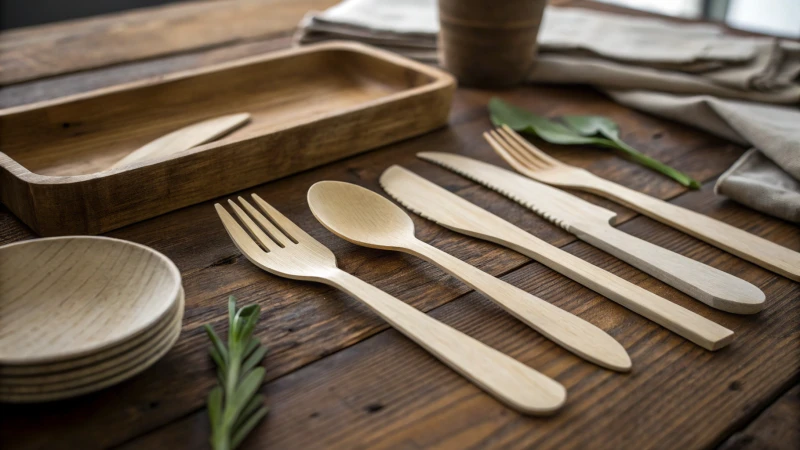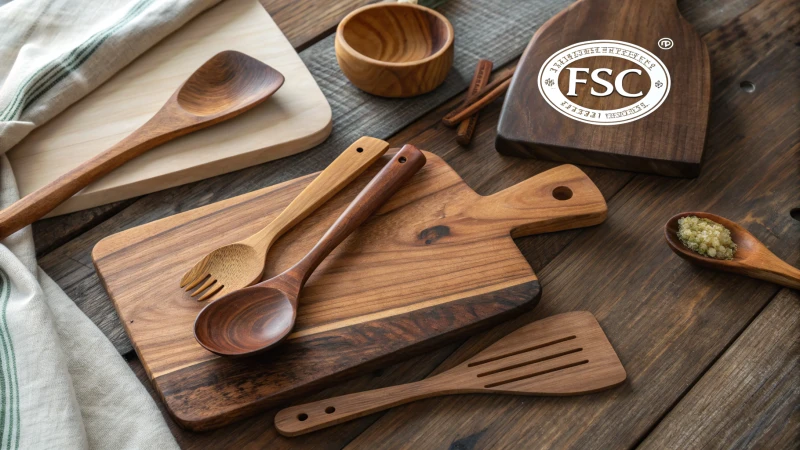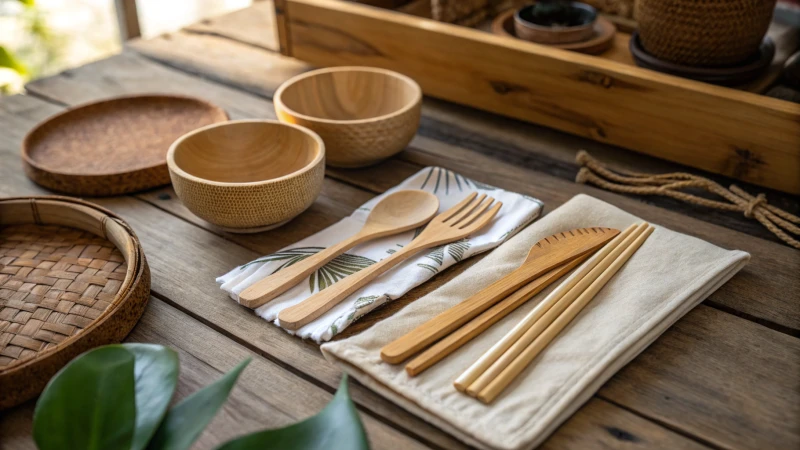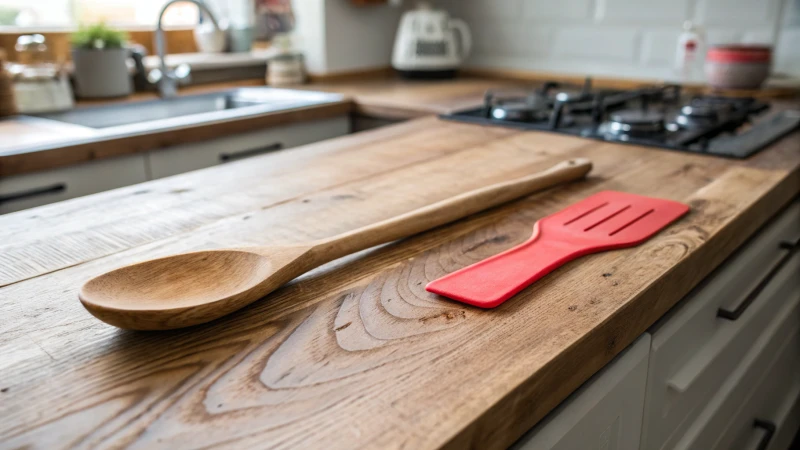
Sitting at a rustic café, I once pondered the safety of my wooden fork. Could something so eco-friendly be risky?
Improperly processed or untreated disposable wooden cutlery can lead to health issues like bacterial contamination and splinters. To avoid these risks, it’s crucial to select utensils that meet food-grade safety standards, ensuring a safe and enjoyable dining experience.
Choosing eco-friendly options like wooden cutlery is a step towards sustainability, but understanding their potential health risks is vital. I remember the first time I delved into this topic, and it opened my eyes to the importance of ensuring these utensils meet safety standards. Let’s explore how you can make informed decisions when selecting wooden cutlery that aligns with your health and eco-friendly values.
Untreated wooden cutlery can harbor bacteria.True
Without proper treatment, wooden cutlery can absorb moisture, promoting bacterial growth.
All wooden cutlery meets food-grade safety standards.False
Not all manufacturers ensure their products meet safety standards, risking contamination.
Why Is Proper Processing of Wooden Cutlery Crucial for Safety?
Ever wondered if your eco-friendly wooden cutlery is truly safe for you and your family?
Improperly processed wooden cutlery can become a health hazard by allowing bacteria to thrive, causing splinters, or leaching harmful chemicals. Ensuring that these utensils are treated correctly and meet food-grade standards is essential for safe use.

Potential Risks of Improper Processing
I remember the first time I used a wooden fork at a picnic. It seemed like a great eco-friendly choice until a little splinter got caught in my lip—ouch! Turns out, when wooden cutlery isn't processed properly, it can indeed pose several risks.
Bacterial Contamination
Wood is naturally porous, which means it can soak up liquids just like a sponge. If these utensils aren't sealed right, they can become a breeding ground for nasty bacteria like E.coli or Salmonella. It's kind of like forgetting to put the lid on your Tupperware—stuff just sneaks in!
| Risk | Description |
|---|---|
| Bacterial Growth | Absorbs moisture, enabling bacteria to thrive |
| Chemical Leaching | Inappropriate treatments can release harmful chemicals into food |
| Physical Hazards | Poor craftsmanship may lead to splinters or breakages |
Chemical Leaching
Some producers might cut corners by using non-food-grade chemicals during production, which could end up in our food. Ensuring that your supplier sticks to food-grade certifications1 is like having a trustworthy friend who always has your back.
Physical Hazards
There's nothing worse than biting into something and finding it's not food—like a sharp splinter! This can happen if the cutlery isn’t sanded down properly. Regular quality checks for smooth finishes2 are essential.
Ensuring Safe Wooden Cutlery Production
To keep our meals both safe and sustainable, manufacturers need to focus on a few key areas:
- Quality Control: Regular inspections and tests should be implemented to ensure consistent product quality.
- Certification: Opt for suppliers with certifications proving adherence to food-grade standards.
- Advanced Manufacturing Techniques: Utilize methods like high-pressure steam treatment to eliminate potential contaminants and ensure a smooth finish.
By addressing these crucial areas, businesses can reduce risks associated with improper processing, offering us peace of mind with every bite. Want to dig deeper into wooden cutlery safety and sustainable practices? Check out more insights here3.
Improper sealing of wooden cutlery leads to bacterial growth.True
Wood's porosity allows moisture absorption, fostering bacterial proliferation.
All wooden cutlery is free from chemical leaching risks.False
Non-food-grade chemicals in processing can leach into food.
What Certifications Should You Look for in Wooden Utensils?
Remember that time you bought those gorgeous wooden spoons only to worry if they were truly safe?
When shopping for wooden utensils, seek out certifications like the Forest Stewardship Council (FSC) for responsible sourcing and food safety certifications to ensure they meet health standards. These certifications guarantee quality, sustainability, and safety.

Understanding Key Certifications
I remember the first time I really dove into the world of sustainable wooden utensils. I had this moment of realization while cooking, wondering about the journey of my wooden spatula before it found its place in my kitchen. It dawned on me just how important it is to choose products that not only serve their purpose but also align with a broader commitment to sustainability.
The Forest Stewardship Council (FSC)4 certification was my first stop. It's reassuring to know that the wood comes from responsibly managed forests. This means not only are they protecting the environment, but they're also supporting local communities. I felt like I was part of a bigger story, contributing to a healthier planet one utensil at a time.
Another key certification to consider is food safety. These standards ensure that the utensils you’re using are made under strict hygiene protocols, which is crucial for someone like me who loves trying out new recipes and sharing meals with family and friends. Certifications like ISO 22000 or those from local health authorities give you peace of mind knowing that your kitchen tools are safe.
| Certification | Purpose |
|---|---|
| FSC | Ensures sustainable sourcing |
| ISO 22000 | Confirms food safety standards |
Why Choose Certified Products?
Choosing certified products isn't just about ticking a box; it's about aligning with values that matter. For me, it's about knowing that every wooden spoon or fork I use reflects my commitment to a more sustainable lifestyle. These certifications don't just offer a competitive edge; they build trust with consumers who care about the planet.
Incorporating certified utensils into your business5 or home isn't just about being eco-friendly; it's about creating a brand or personal image that people trust and respect. It's like inviting others into a shared journey toward sustainability.
How to Verify Certifications
I once spent an afternoon chatting with a supplier about their certification process, and it was enlightening. It's more than just checking labels—it's about building relationships with suppliers who can provide documentation or direct links to certifying bodies' websites. This transparency is key in maintaining authenticity.
If you can, visit manufacturers or ask for third-party audits. This level of due diligence not only assures you of product legitimacy but also strengthens your relationship6 with suppliers committed to genuine sustainable practices. It’s all part of making informed choices that resonate with who we are and what we stand for.
FSC certification ensures sustainable wood sourcing.True
FSC certification verifies that wood is sourced from sustainably managed forests.
ISO 22000 is unrelated to wooden utensil safety.False
ISO 22000 relates to food safety, ensuring utensils meet hygiene standards.
What Are the Safe Alternatives to Untreated Wooden Cutlery?
Imagine you're hosting a cozy dinner party, and suddenly, a guest asks about the safety of the wooden cutlery you're using. Let's explore safer, eco-friendly alternatives that keep both health and sustainability in mind.
Yes, there are safe alternatives to untreated wooden cutlery, such as bamboo utensils, coated wooden cutlery, and biodegradable plastics. These options enhance hygiene while supporting sustainability.

Exploring the Risks of Untreated Wooden Cutlery
I remember the first time I used untreated wooden cutlery at a picnic. It was charming, but after a while, I noticed how quickly it absorbed stains from the food. Untreated wood can be a breeding ground for bacteria because it absorbs moisture easily, which isn't ideal for maintaining food-grade safety7 standards.
Safer Alternatives: Bamboo and Coated Wood
-
Bamboo Cutlery: On another occasion, I tried bamboo cutlery during a family BBQ, and it was fantastic! Bamboo's natural antibacterial properties mean it doesn't need chemical treatments. Plus, its rapid growth makes it an eco-friendly choice if you're worried about deforestation.
-
Coated Wooden Utensils: I've also experimented with coated wooden utensils at a friend's brunch. The natural oil or wax coating acts as a protective barrier against moisture and bacteria, making them much safer. Just ensure the coatings are non-toxic and food-safe.
Biodegradable Plastics: An Emerging Option
While planning a sustainable office party, I discovered biodegradable plastics made from plant-based materials like PLA (polylactic acid). These decompose much faster than traditional plastics, making them a great option for reducing environmental impact without sacrificing hygiene.
| Material | Benefits | Drawbacks |
|---|---|---|
| Bamboo | Antibacterial, sustainable | May require imports, varying quality |
| Coated Wooden Cutlery | Enhanced hygiene, natural appearance | Requires regular re-coating |
| Biodegradable Plastic | Reduced environmental impact, high hygiene | Limited durability, higher cost |
Ensuring Safety in Production Processes
When choosing suppliers for these alternatives, I always check for certifications like FSC (Forest Stewardship Council) or ISO 22000. These indicate compliance with safety guidelines8 and eco-friendly practices. This way, I can confidently select cutlery that aligns with health and sustainability goals while appealing to eco-conscious consumers.
By focusing on these alternatives, I can ensure that my dining experiences are both safe and environmentally friendly. It's reassuring to know there are options that support both personal health standards and eco-friendly practices. Explore the benefits9 of these sustainable choices further to make informed procurement decisions.
Bamboo cutlery is naturally antibacterial.True
Bamboo has natural antibacterial properties, making it a safe alternative.
Untreated wooden cutlery meets food-grade safety standards.False
Untreated wood does not meet food-grade standards due to bacteria risks.
How Do Wooden Utensils Compare to Plastic in Terms of Hygiene?
Have you ever stood in your kitchen, spatula in hand, wondering if your choice of wooden or plastic utensils makes a difference in hygiene?
Wooden utensils are generally more hygienic than plastic ones due to their natural antibacterial properties. While both materials can harbor bacteria if not cleaned properly, wood tends to be less prone to contamination.

The Antibacterial Properties of Wood
I remember the first time I switched to wooden utensils. It was a revelation! Not only did they feel more natural and earthy, but I learned they also had these amazing antibacterial properties. Apparently, certain types of wood, like oak, have the superpower to kill bacteria within minutes. This is because wood naturally contains compounds that fight off bacterial growth, unlike plastic which can get scratched up, creating a cozy little home for bacteria.
Cleaning and Maintenance
Keeping your kitchen tools clean is crucial, no matter what they’re made from. Personally, I find a sense of satisfaction in washing my wooden spoons with warm soapy water, knowing I'm preserving their longevity. Plus, a quick rub with lemon and salt10 does wonders for refreshing them naturally. Meanwhile, plastic utensils are more convenient for the dishwasher, but I’ve seen them degrade over time from the heat—sometimes even cracking, which is just asking for bacterial trouble.
| Feature | Wooden Utensils | Plastic Utensils |
|---|---|---|
| Antibacterial Nature | High | Low |
| Cleaning Ease | Manual cleaning recommended | Dishwasher safe, but may degrade |
| Durability | Can last long with proper care | Prone to wear and tear |
Environmental and Health Considerations
Beyond just keeping my kitchen germ-free, I'm always thinking about the bigger picture—like the environment. Wooden utensils are completely biodegradable, which means less waste piling up in landfills. Plus, there’s peace of mind knowing that I’m not risking harmful chemicals from plastics leaching into my food, especially when things get hot in the kitchen.
When choosing between wooden and plastic utensils, it’s not just about hygiene. It’s about considering the impact on our planet and our health. For me, it's a no-brainer to opt for sustainable choices that align with my values while ensuring my kitchen remains a safe and eco-friendly space.
Wooden utensils have antibacterial properties.True
Wood naturally inhibits bacterial growth due to its compounds.
Plastic utensils are more durable than wooden ones.False
Plastic degrades over time, leading to wear and tear.
Conclusion
Untreated or improperly processed wooden cutlery poses health risks like bacterial contamination and splinters. Choosing certified, food-grade options ensures safety while supporting eco-friendly practices.
-
Explore the importance of food-grade certifications to guarantee chemical safety in wooden utensils. ↩
-
Discover techniques to achieve smooth finishes on wooden cutlery, reducing physical hazards like splinters. ↩
-
Gain insights into sustainable practices that enhance the safety and eco-friendliness of wooden cutlery. ↩
-
The FSC certification ensures that products come from responsibly managed forests, offering environmental, social, and economic benefits. ↩
-
Choosing certified utensils enhances brand image and shows commitment to sustainability, which can attract eco-conscious consumers. ↩
-
Verifying certifications builds trust and ensures products meet sustainability claims, enhancing supplier relationships. ↩
-
Understanding these standards ensures your cutlery meets safety regulations, reducing health risks for consumers. ↩
-
These certifications verify compliance with safety and sustainability standards, crucial for choosing reliable suppliers. ↩
-
Learn how these options reduce environmental impact while providing safe dining solutions. ↩
-
Lemon and salt are natural cleansers that effectively remove odors and bacteria from wooden surfaces without harsh chemicals. ↩

